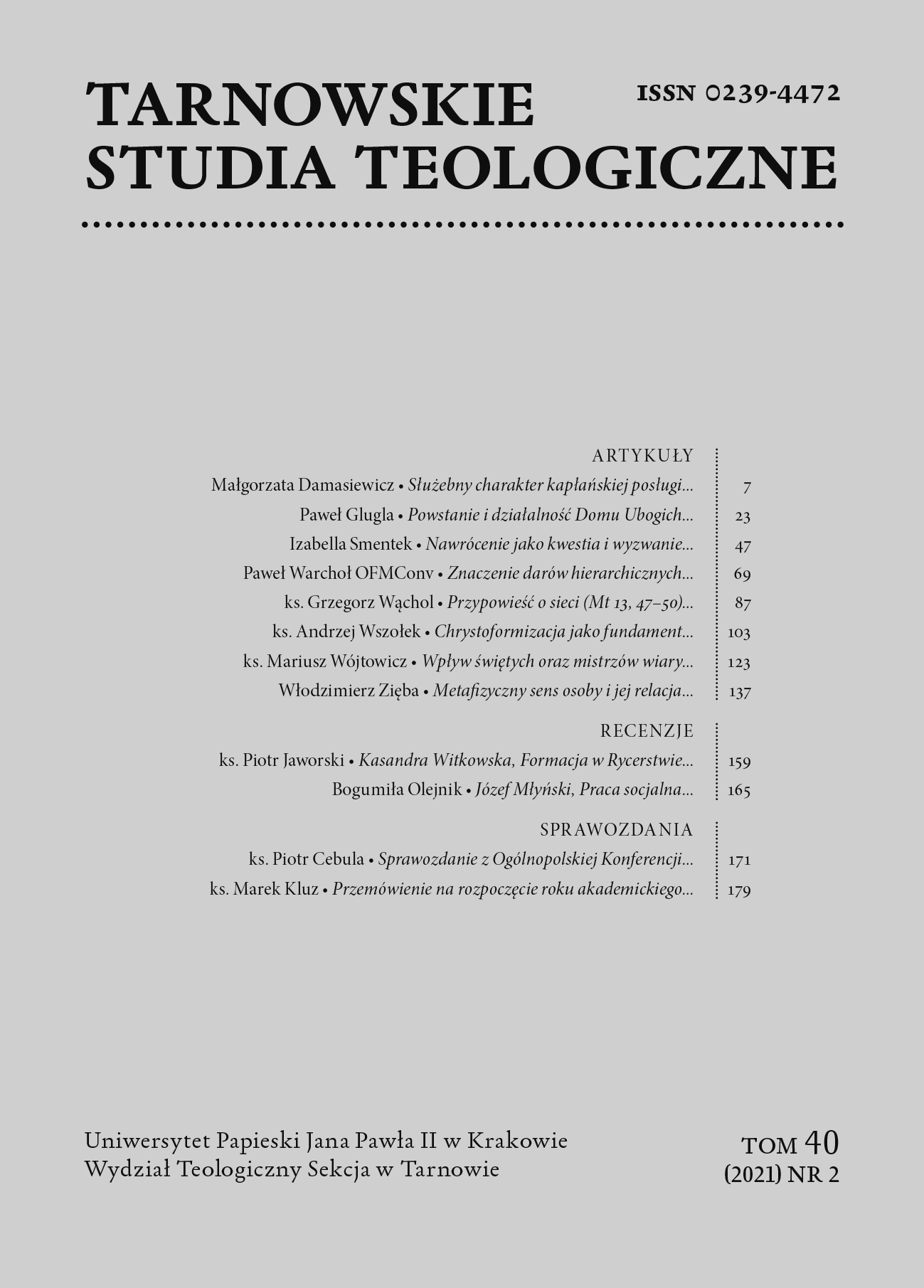Conversion as ecumenical question and challenge
DOI:
https://doi.org/10.15633/tst.40203Keywords:
Holy Spirit, conversion, faith, ecclesial unity, ecumenismAbstract
Pope John Paul II makes conversions the leading topic of his Ut unum sint encyclical. However, this notion is not unambiguously understood by different denominations’ theologians. The claim for unity tends to be experienced in various ways within the particular ecclesial communities, as well. Ecumenical activity, prayer and cooperation stand on the very beginning of the track to reconciliation, which is not to be achieved by human forces. Nevertheless, these efforts are necessary and indispensable. Conversion means to accept God’s initiative. It’s conversion to faith, done in truth, that leads to give up selfishness and prejudice. Nowadays, even in this field misunderstandings, or at least interpretation differences, are to be found. Sometimes instead of on the return to the ground of faith, the emphasis is put on the ecological or historical conversion (from racism, colonialism and so on). The recognition of the Trinitarian Communion as source of ecclesial unity is common for all Christians. Nonetheless, in some interpretations the present spiritual “unity in diversity” seems enough and there is no need to reestablish its visual character. Christian conversion leads to complete, personal gift of self. The proof of this is to witness for Christ. John Paul II teaches that in the case of martyrs from various denominations true unity of Christians actually exists. Those, who are fully united with Christ, cannot be further divided among themselves.
References
Benedykt XVI, Homilia w czasie nieszporów na zakończenie Tygodnia Modlitw o Jedność Chrześcijan, Rzym, Bazylika św. Pawła za Murami, 25.01.2012, http://www.vatican.va/content/benedict-xvi/it/audiences/2012/documents/hf_ben--xvi_aud_20120125.html (22.10.2021).
Benedetto XVI, Udienza generale, 17.01.2007, http://www.vatican.va/content/benedict-xvi/it/audiences/2007/documents/hf_ben-xvi_aud_20070117.html (22.10.2021).
Benedetto XVI, Udienza generale, 23.01.2008, http://www.vatican.va/content/benedict-xvi/it/audiences/2008/documents/hf_ben-xvi_aud_20080123.html (22.10.2021).
Benedetto XVI, Udienza generale, 18.01.2012, http://www.vatican.va/content/benedict-xvi/it/audiences/2012/documents/hf_ben-xvi_aud_20120118.html (22.10.2021).
Ciobotea D., The Significance of the Trinitarian Theology for the Life and the Mission of the Church, „International Journal of Orthodox Theology” 1 (2010) nr 1, s. 28–32.
Franciszek, Encyklika Fratelli tutti, 3.10.2020.
Dulles A., Dogma as an ecumenical problem, „Theological Studies” 29 (1968) nr 3, s. 397–416.
Dulles A., Ius divinum as an ecumenical problem, „Theological Studies” 38 (1977) nr 4, s. 681–708.
Dulles A., The dimensions of the Church. A postconciliar reflection, Westminster 1967.
Jan Paweł II, Encyklika Dominum et vivificantem, 8.05.1986.
Jan Paweł II, Encyklika Ut unum sint, 25.05.1995.
Jan Paweł II, Przemówienie podczas spotkania ekumenicznego w Hali Ludowej, Wrocław 31.05.1997, w: V pielgrzymka Jana Pawła II do Ojczyzny, opr. J. Górny, Olsztyn 1997.
Kantyka P., Dialog ekumeniczny, „Studia Nauk Teologicznych” 5 (2010), s. 187–197.
Katechizm Kościoła katolickiego, Poznań 1994.
Pawłowski S., Teologia jedności Kościoła. Zarys problematyki, „Studia Nauk Teologicznych” 10 (2015), s. 185–197.
Pellegrinaggio giubilare di Sua Santità Giovanni Paolo II in Terra Santa (20–26.03.2000). Omelia di Giovanni Paolo II, Stadio di Amman — Giordania, 21.03.2000, http://www.vatican.va/content/john-paul-ii/it/homilies/2000/documents/hf_jp-ii_hom_20000321_amman.html (22.10.2021).
Santorski A., Dar łaski, Warszawa 2011.
Sobór Watykański II, Dekret Unitatis redintegratio, 21.11.1964.
Sobór Watykański II, Konstytucja dogmatyczna Lumen gentium, 21.11.1964.
Sobór Watykański II, Konstytucja duszpasterska Gaudium et spes, 7.12.1965.
Stolz J., Die evangelikale Bekehrung aus systemtheoretischer Sicht, „Soziale Systeme. Zeitschrift für soziologische Theorie” 6 (2000) nr 1, s. 55–84.
Strzelecka H., Służebnice Jezusa w Eucharystii na terenach Związku Radzieckiego w latach 1945–1991, Warszawa 1994.
Teodorescu M., Christian Attitude in the Face of Human Divergences. A New Testament Testimony, „International Journal of Orthodox Theology” 10 (2019) nr 4, s. 198–221; https://www.orthodox-theology.com/media/PDF/4.2019/MihaiTeodorescu.pdf (22.10.2021).
Tomasz z Akwinu, Suma teologiczna (w skrócie), red. F. Bednarski, Warszawa 2000.
Tveit O. F., Szansa ekumeniczna roku 2017, „Studia i Dokumenty Ekumeniczne” 34 (2018) nr 1, s. 198–221.
Warzeszak J., Z Benedyktem XVI w drodze ku pełnej jedności chrześcijan, „Warszawskie Studia Teologiczne” 30 (2017) nr 3–4, s. 54–86.
World Council of Churches. Commission on World Mission and Evangelism, Study paper — „Converting Discipleship: Dissidence and Metanoia”, https://www.oikoumene.org/resources/documents/study-paper-converting-discipleship-dissidence-and-metanoia (29.04.2021).
Xionis N., Conditions for a Critique of the Joint Declaration on the Doctrine of Justification between Lutherans and Roman Catholics from the view of the Orthodox theology, „International Journal of Orthodox Theology” 9 (2018) nr 1, s. 111–127.
Downloads
Published
Issue
Section
License

This work is licensed under a Creative Commons Attribution 4.0 International License.
Authors who publish with this journal agree to the following terms:
- Authors retain the copyright and full publishing rights without restrictions, and grant the journal right of first publication with the work simultaneously licensed under a Creative Commons Attribution 4.0 International License that allows others to share the work with an acknowledgement of the work's authorship and initial publication in this journal.
- Authors are able to enter into separate, additional contractual arrangements for the non-exclusive distribution of the journal's published version of the work (e.g., post it to an institutional repository or publish it in a book), with an acknowledgement of its initial publication in this journal.
- Authors are permitted and encouraged to post their work online (e.g., in institutional repositories or on their website) prior to and during the submission process, as it can lead to productive exchanges, as well as earlier and greater citation of published work (See The Effect of Open Access).

